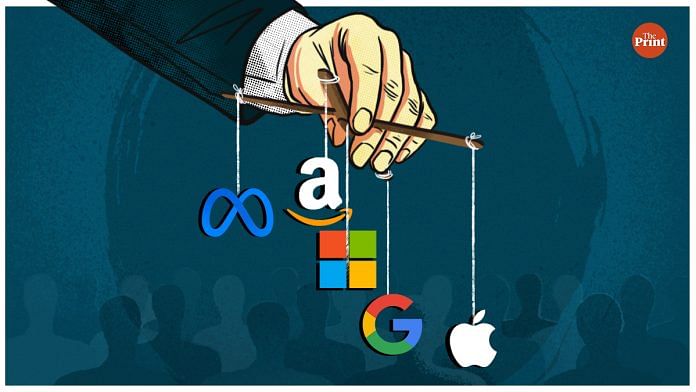Battles against Big Tech (Meta, Amazon, Microsoft, Alphabet, and Apple, or MAMAA) aren’t new. But they have reached a defining moment. Earlier this month, two possibly epochal cases got underway in the US against Alphabet (Google) and Amazon — the biggest since action against Microsoft in 1998.
In Europe, meanwhile, hefty fines running into billions of euros have already been imposed on tech companies in at least three instances. Now a “revolutionary” law has been passed and another unveiled this week, giving customers the freedom to decide what apps they want and delete pre-loaded software, and enabling more competition to Google Pay and Apple Wallet. Fines can go up to 10 percent of company turnover for abuse of monopoly power, invasion of privacy, etc.
A similar law was passed in the UK in the summer.
New legislation has been stymied in the US Congress, partly because of active lobbying by MAMAA, but the Department of Justice and the Federal Trade Commission have filed aggressive lawsuits that seek to extend the reach of existing anti-trust (monopoly) legislation. The attempt is to go beyond the accepted goal of protecting consumers, interpreting the law to protect rival businesses as well.
In India, meanwhile, the Competition Commission has imposed record fines totalling Rs 2,280 crore in two cases against Google, with a third case still being heard.
It’s been a long journey to here, from seeing the internet as a regulation-free, everything-goes world of dynamic entrepreneurs creating and meeting consumer needs in the digital age with new technology, exciting innovations and novel business models.
That was bound to change as free speech became toxic, social media platforms influenced national politics, and as Chinese influence on Big Tech’s policies became a strategic worry. Content moderation has raised political hackles and become public policy.
The charges against Big Tech include violating privacy in the way that personal data is used (or misused), and promoting paid-for content over others in response to search queries. One study found that 16 of the first 20 results in an Amazon product search were ads. There are also charges of tax avoidance.
Meanwhile, this handful of companies began to challenge governments in their reach and power, with the financial clout of the five companies exceeding that of the S&P 500, stock market valuations in trillions of dollars, and incomes so large as to reduce record fines imposed on them into little more than flea bites. MAMAA profitability, twice the S&P 500 average of 10 percent, has come to be seen increasingly as flowing from the abuse of market power.
The business practices under fire include pre-installing Google software on mobile phones (paying Apple billions of dollars for the privilege), denying interoperability across operating systems and creating “walled gardens”, snuffing out possible competitors or buying them out (Meta’s acquisition of Instagram and WhatsApp), and dealing unfairly when sharing advertising revenue with news publishers.
In 2021 Australia passed a law mandating a level playing field for publishers. One tech company responded by blanking out Australia, but later settled. It has not reached the stage where regulators seek to break up companies (as was done with AT&T in 1984), but calls for such action have been aired by lawmakers.
The companies have responded to this escalating assault with vigorous defence and aggressive lobbying, but they have also responded to adverse verdicts by making changes to their business models in different geographies. Meta has stopped targeting teenagers with ads based on their app activity, Google has expanded access to the data used by its ad business, and TikTok allows users to choose a non-personalised feed.
These may not be enough. Amazon could face restrictions on selling its own products on its platform because of conflicts of interest with third-party sellers, Google could cease to account for 90 percent of search enquiries, and Apple could end up changing the rules for access to its App Store.
All this when, for unrelated reasons, Big Tech’s share prices took a beating in 2022, recovering partially this year, even as four MAMAA companies announced large-scale layoffs. Big Tech’s battles are on more than one front.
By special arrangement with Business Standard.
Also Read: Southern states staring at delimitation timebomb, govt should make them an offer



